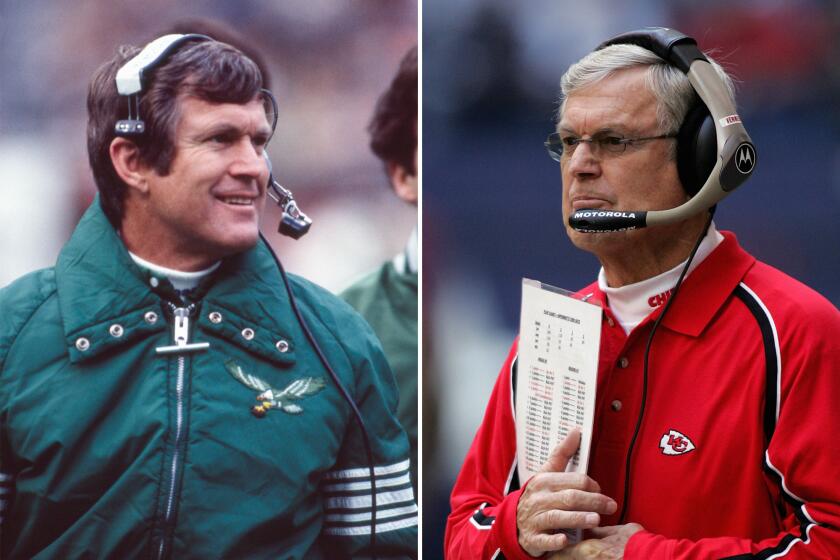A WHOLE NEW BALLGAME : Most NFL Owners Have Gained Their Negotiating Experience in Pro Football
- Share via
William Clay Ford, president of the Detroit Lions, comes from a family that has had considerable experience with labor unions.
Only the other day, in fact, Ford’s favorite car company settled again with the auto workers.
But the family is no longer running the company. And although Ford is an expert, of a sort, on nuts and bolts, he never did spend much of his time discussing nuts-and-bolts issues with labor leaders.
That makes him about even with the others who own franchises in the National Football League.
Over the years, as individuals, the NFL’s owners haven’t had many face-offs with unions. In fact, they have gained most of their labor experience in football. The six members of the NFL’s strike committee--the executive committee of the Management Council--are characteristic.
As football men, they are responsible for the league’s fight against the players. But as businessmen, the businesses they own are generally too small for serious labor fighting.
Hugh Culverhouse, who doubles as chairman of the executive committee and president of the Tampa Bay Buccaneers, is a tax attorney who in 1983 formed two small businesses in Florida.
They are a land development company, Bay Venture, which last year had 20 employees and $932,000 in sales, and a water supply company, Central County Utility, which has nine employees and announced $106,000 in sales.
The other mover and shaker on the strike committee, Tex Schramm, lists himself as the president of two firms--the Dallas Cowboys and Dallas Cowboy Travel Inc.
The travel company, which makes the airline arrangements for Schramm and the football team, among others in the organization, named only two employees last year but it announced $1.65 million in sales.
The two biggest businesses in the personal lives of strike committee members are race tracks. And in both instances, the tracks belong not to them but to their families.
These are Yonkers and Foxboro in New York and Massachusetts, which are owned, respectively, by the Rooney and Sullivan families.
Art Rooney is also the board chairman of the Pittsburgh Steelers. Bill Sullivan is president of the New England Patriots.
His son, Charles Sullivan, executive vice president of the Patriots and a veteran member of the NFL strike committee, is listed as president of the Foxboro track.
Rooney’s son, Dan, president of the Steelers and their member on the executive committee, is an owner but not an officer at Yonkers, which listed five other Rooneys as officers--among them Tim, Dan’s brother, the track’s president.
The Foxboro track listed 500 employees last year but didn’t announce its total sales.
Yonkers, which listed 76 employees, announced $37.5 million in sales, down from $177 million in 1985 and $216 million in 1982.
In common with other race tracks, Yonkers has had some labor trouble in recent years. A strike by security and parking employees was averted just before opening day in 1983 when union members agreed to a raise of $3 a shift.
Two years later, a strike by building service employees shut Yonkers down for 11 days.
Shortly before Yonkers officials settled that time, they announced that they had hired 200 nonunion workers, according to 1985 news service reports.
When the union settled for a pay increase of $2 a day, the track said it would keep the nonunion applications on file.
Chuck Sullivan, Dan Rooney and Paul Brown’s son Michael--who works for the Cincinnati Bengals as assistant general manager--are typical strike committee members.
That is by design. Since the Management Council was formed in the 1970s, the league has avoided putting its wealthiest owners where they would have to bargain with the players.
Among NFL owners who never deal directly with the union are those named by Forbes magazine each year as among the richest men in America--Leon Hess of the New York Jets, Edward J. DeBartolo of the San Francisco 49ers, Jack Kent Cooke of the Washington Redskins, H.R. (Bum) Bright of the Dallas Cowboys, Ford and several others.
Though these people often call the shots for the NFL, they never fire the gun.
During a strike, most can’t even be reached to be quoted, although, presumably, their labor views would be of interest to the players as well as the football public.
A source said that instead of calling on its wealthiest owners, the league, when it names a strike committee, strives to appoint individuals with whom it thinks the players can identify. One of these is the NFL’s only self-made millionaire, Joe Robbie, owner of the Miami Dolphins.
Most players can empathize with Robbie, the one-time Minneapolis lawyer who has tied up virtually his entire fortune in his new stadium near Miami.
Of all NFL owners, Robbie has the most to lose in a protracted strike. But he won’t lose everything. The final irony is that among those on the strike committee, Robbie owns the largest nonfootball business.
That is Nelson Laboratories, a firm in Sioux Falls, S.D., where Robbie onced lived.
Nelson, which wholesales veterinarian supplies in the Midwest, listed 21 employees last year and $11.9 million in sales. Robbie is chairman of the board.
Times researcher Tom Lutgen assisted in the preparation of this story.
More to Read
Go beyond the scoreboard
Get the latest on L.A.'s teams in the daily Sports Report newsletter.
You may occasionally receive promotional content from the Los Angeles Times.










